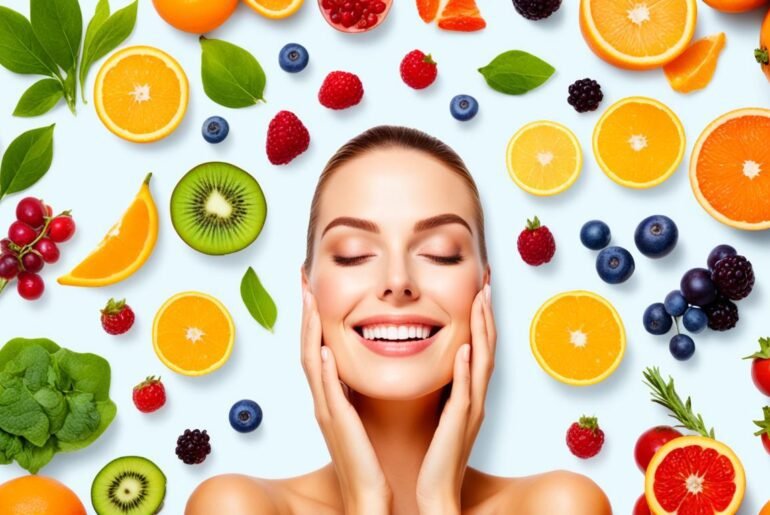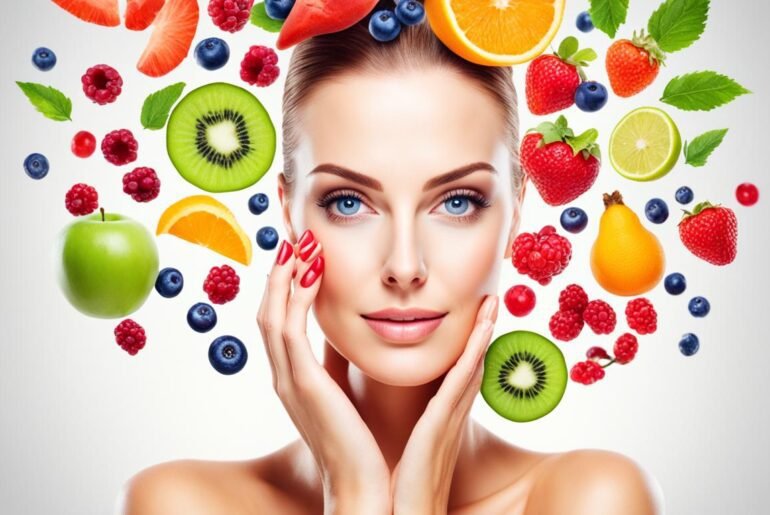Did you know that UV radiation is a major environmental factor in the development of skin cancer and skin aging?
Every day, our skin is exposed to reactive oxygen species (ROS) and oxidative stress from various sources, including the sun. UV exposure leads to the generation of ROS and oxidative stress, causing damage to the skin cells. While our skin has its own defense mechanisms, such as melanin and enzymatic antioxidants, they are often not enough to fully protect against UV-induced skin damage.
That’s where antioxidants come in. They play a crucial role in preventing skin damage by reducing oxidative stress and neutralizing free radicals. Boosting the levels of antioxidants in our skin can provide added protection and help maintain its health and youthful appearance.
Key Takeaways:
- UV radiation is a major contributor to skin cancer and skin aging.
- Oxidative stress and ROS generated by UV exposure can damage the skin cells.
- Antioxidants help reduce oxidative stress and neutralize free radicals in the skin.
- Melanin and enzymatic antioxidants are not always sufficient to protect against UV-induced skin damage.
- Boosting antioxidant levels in the skin can help prevent skin damage and maintain its health.
The Role of Antioxidants in Skin Protection
Antioxidants are essential for protecting the skin from oxidative stress and preventing skin damage. These powerful compounds help neutralize free radicals, reduce inflammation, and promote overall skin health. Incorporating natural antioxidants into your diet and using antioxidant-rich skincare products can enhance the skin’s defenses against oxidative stress, keeping it healthy and rejuvenated.
The skin is constantly exposed to environmental factors like UV radiation and pollution, which can lead to the generation of reactive oxygen species (ROS) and oxidative stress. High levels of oxidative stress can damage the skin cells and accelerate the aging process. However, antioxidants help counteract this damage by inhibiting the harmful effects of free radicals and reducing oxidative stress.
One way to introduce natural antioxidants into your skincare routine is through antioxidant-rich foods. Fruits and vegetables like berries, citrus fruits, spinach, and kale are packed with vitamins C and E, which are potent antioxidants that promote skin health and protect against free radicals. Including these foods in your diet can provide additional nourishment and protection for your skin.
“Eating a colorful variety of fruits and vegetables is not only beneficial for your overall health but also helps maintain glowing and youthful skin.”
In addition to a healthy diet, using skincare products that contain antioxidants can further enhance the skin’s defense mechanisms. Look for products that include ingredients like vitamin C, vitamin E, green tea extract, or resveratrol. These antioxidants can penetrate the skin and provide direct protection against oxidative stress.
Using antioxidant-rich skincare products can help:
- Combat signs of aging, such as fine lines and wrinkles
- Improve skin elasticity and firmness
- Reduce inflammation and redness
- Promote a radiant and youthful complexion
Remember to choose products that suit your skin type and concerns, and incorporate them into your daily skincare routine for optimal results.
Antioxidant Skincare Tip
For an extra boost of antioxidants, consider adding a serum or facial oil enriched with antioxidant-rich botanical extracts, such as green tea, pomegranate, or rosehip oil, to your skincare regimen. These concentrated formulas can deliver a potent dose of antioxidants directly to your skin, nourishing and protecting it from within.
Enhancing your skin’s antioxidant defense is key to maintaining healthy, glowing skin. Including natural antioxidants in your diet and incorporating antioxidant skincare products into your routine can help protect your skin from oxidative stress, prevent signs of aging, and promote overall skin health.
| Antioxidant-Rich Foods | Benefits for Skin Health |
|---|---|
| Berries (strawberries, blueberries, raspberries) | High in vitamin C and anthocyanins, which protect against free radicals and promote collagen production. |
| Dark leafy greens (spinach, kale) | Rich in vitamin E and beta-carotene, which help fight oxidative stress and maintain skin elasticity. |
| Nuts (almonds, walnuts) | Contain vitamin E and omega-3 fatty acids, which nourish the skin and improve its texture. |
| Green tea | Contains polyphenols, particularly EGCG, which have anti-inflammatory and protective effects on the skin. |
| Avocado | Rich in monounsaturated fats and vitamin E, which hydrate and nourish the skin. |
The Benefits of Antioxidants for Maintaining Healthy Skin

Antioxidants play a crucial role in skincare, offering numerous benefits for maintaining healthy skin. They are essential in protecting the skin by combating oxidative stress and minimizing the damage caused by UV radiation. In addition to these protective properties, antioxidants also possess anti-inflammatory capabilities, helping to reduce skin redness and inflammation.
One of the key benefits of antioxidants for maintaining healthy skin is their ability to promote collagen production. Collagen is a protein that provides structural support and elasticity to the skin. As we age, collagen production naturally decreases, leading to the formation of wrinkles and sagging skin. Antioxidants help stimulate collagen synthesis, aiding in maintaining skin’s firmness and elasticity, resulting in a more youthful appearance.
While antioxidants can be obtained through a healthy diet rich in fruits, vegetables, and other antioxidant-rich foods, sometimes it may be necessary to supplement antioxidant intake. Antioxidant supplements can provide an extra boost of these beneficial compounds, helping to support overall skin health.
When selecting antioxidant supplements for skin health, it is important to choose those that are effective and suitable for your individual needs. Some popular antioxidant supplements for skin health include:
- Vitamin C: Known for its powerful antioxidant properties, vitamin C helps protect the skin from free radicals, stimulates collagen production, and brightens the complexion.
- Vitamin E: Vitamin E is a potent antioxidant that helps protect against oxidative damage caused by UV radiation. It also aids in moisturizing and nourishing the skin.
- Coenzyme Q10: CoQ10 is a natural antioxidant that helps reduce oxidative stress and promote healthy skin cell function. It also has anti-aging benefits and helps improve the appearance of wrinkles and fine lines.
- Resveratrol: Found in grapes and berries, resveratrol is a powerful antioxidant that helps protect against environmental damage and supports skin health.
It is important to note that while antioxidant supplements can be beneficial for maintaining healthy skin, they should be used in conjunction with a comprehensive skincare routine that includes a healthy diet, proper sun protection, and regular use of antioxidant-rich skincare products.
Expert Tip: Topical Antioxidants
“In addition to taking antioxidant supplements, incorporating topical antioxidant products into your skincare routine can provide targeted protection and nourishment for the skin. Look for products containing ingredients such as green tea extract, niacinamide, and retinol, as they have proven antioxidant properties and offer numerous benefits for maintaining healthy skin.”
In conclusion, antioxidants are vital for maintaining healthy skin. Their ability to protect against oxidative stress, reduce inflammation, and stimulate collagen production makes them an essential component of any skincare regimen. Whether through a nutritious diet, antioxidant supplements, or topical skincare products, incorporating antioxidants into your routine can support overall skin health and contribute to a radiant, youthful complexion.
The Role of Melanin and Enzymatic Antioxidants in Skin Protection
Melanin is a crucial component of the skin’s defense against UV-induced DNA damage. Naturally produced by melanocytes, melanin acts as a pigment that helps absorb and scatter UV radiation, reducing its penetration into the skin. While melanin provides initial protection, it alone is not enough to fully safeguard the skin against damage.
Enzymatic antioxidants play a vital role in enhancing the skin’s protection against oxidative stress. Two important enzymatic antioxidants, superoxide dismutase (SOD) and catalase, work together to neutralize free radicals and counteract oxidative damage in the skin.
“Melanin along with enzymatic antioxidants provides a comprehensive defense mechanism against UV-induced skin damage.”
By combining the absorptive and scattering properties of melanin with the free radical-neutralizing capabilities of enzymatic antioxidants, the skin’s protective mechanisms are significantly amplified, providing optimal defense against harmful UV radiation.
Enhanced Skin Protection Mechanism
In combination, melanin and enzymatic antioxidants create a powerful defense system that helps protect the skin from oxidative stress and potential DNA damage caused by UV exposure. Melanin’s ability to absorb and scatter UV radiation mitigates its harmful effects, while enzymatic antioxidants help neutralize the free radicals generated by UV radiation, preventing oxidative damage.
This synergistic interaction between melanin and enzymatic antioxidants promotes overall skin health and reduces the risk of skin damage and premature aging.
Strategies for Enhancing Antioxidant Defense in the Skin
When it comes to protecting your skin from oxidative stress and maintaining its health, enhancing antioxidant defense is crucial. There are several effective strategies that can help boost antioxidant levels in the skin, providing added protection against damage caused by free radicals. Let’s explore some of these strategies:
- Minimize exposure to UV radiation: Excessive sun exposure can lead to the generation of free radicals in the skin. To minimize this risk, it is important to limit your time in the sun, especially during peak hours. Wear protective clothing, such as hats and long-sleeved shirts, and always apply a broad-spectrum sunscreen with an SPF of 30 or higher.
- Incorporate antioxidant-rich foods into your diet: Consuming a diet rich in antioxidants can provide your skin with the necessary nutrients to combat oxidative stress. Include foods such as berries, leafy greens, nuts, and seeds, which are packed with vitamins C and E, as well as other essential antioxidants.
- Utilize skincare products with antioxidants: Applying skincare products that contain antioxidants can deliver these beneficial compounds directly to your skin. Look for ingredients like vitamin C, vitamin E, green tea extract, and coenzyme Q10. Regularly using antioxidant-rich serums or creams can help enhance antioxidant defense in the skin.
By implementing these strategies, you can effectively boost antioxidant levels in your skin and provide it with the necessary protection against oxidative stress. Take proactive steps to preserve your skin’s health and enhance its natural defense mechanisms.
Expert Tip:
“Minimizing exposure to UV radiation and incorporating antioxidant-rich foods into your diet are important steps in enhancing your skin’s antioxidant defense. Additionally, using skincare products with antioxidants can provide an extra layer of protection against free radicals.”
Remember, prevention is key when it comes to maintaining healthy and radiant skin. By adopting these strategies, you can empower your skin to combat oxidative stress, promote a youthful appearance, and achieve long-term skin health.
| Strategy | Benefits |
|---|---|
| Minimize exposure to UV radiation | Reduces the production of free radicals in the skin |
| Incorporate antioxidant-rich foods into your diet | Provides essential nutrients to combat oxidative stress |
| Utilize skincare products with antioxidants | Delivers beneficial compounds directly to the skin |
The Role of Vitamin E and Beta-Carotene in Skin Protection

Vitamin E and beta-carotene are essential antioxidants that greatly contribute to skin protection and overall skin health. These powerhouse nutrients offer a range of benefits, from neutralizing free radicals to reducing inflammation and supporting a healthy complexion.
Vitamin E, known for its exceptional antioxidant properties, plays a crucial role in shielding the skin from oxidative damage. It works to counteract the harmful effects of free radicals, which can lead to premature aging and skin damage. Additionally, vitamin E possesses anti-inflammatory properties that help soothe and calm the skin, minimizing redness and irritation.
Beta-carotene, a precursor to vitamin A, is another vital nutrient in skin protection. It acts as a natural sunblock, safeguarding the skin against the damaging effects of UV radiation. Beta-carotene helps shield the skin from harmful UV-induced skin damage, reducing the risk of sunburn and skin cancer.
Including foods that are rich in vitamin E and beta-carotene in your diet can significantly enhance your skin’s defense against oxidative stress and external aggressors. Some excellent sources of vitamin E include almonds, spinach, sunflower seeds, and avocados, while beta-carotene-rich foods include carrots, sweet potatoes, apricots, and kale. By incorporating these nutrient-packed foods into your daily meals, you can support healthy skin and amplify your body’s antioxidant defense mechanism.
Both vitamin E and beta-carotene play a pivotal role in maintaining the integrity and health of your skin. By nourishing your body with these antioxidants, you provide it with the essential tools it needs to combat oxidative stress, prevent skin damage, and promote a radiant, youthful complexion.
Benefits of Vitamin E:
- Neutralizes free radicals in the skin
- Reduces inflammation and skin irritation
- Helps maintain a healthy complexion
Benefits of Beta-Carotene:
- Acts as a natural sunblock
- Protects the skin against UV-induced damage
- Reduces the risk of sunburn and skin cancer
The Protective Effects of Green Tea Polyphenols in Skin
Green tea polyphenols, particularly (-)-epigallocatechin-3-gallate (EGCG), have been shown to have protective effects on the skin.
EGCG, as a potent antioxidant, helps neutralize free radicals and reduce oxidative stress in the skin. This antioxidant activity plays a crucial role in preventing skin damage and maintaining skin health.
Moreover, green tea polyphenols have anti-inflammatory properties that help soothe the skin and reduce redness and inflammation.
Research has also shown that EGCG exhibits anti-carcinogenic properties, making it beneficial in reducing the risk of skin cancer development.
To harness the protective effects of green tea polyphenols, incorporating green tea into your skincare routine or using skincare products that contain green tea extracts can provide additional antioxidant protection for the skin.
By embracing the natural power of green tea polyphenols, you can support your skin’s health and achieve a radiant complexion.
Enhance your skincare regimen with the goodness of green tea polyphenols and experience the benefits of this potent antioxidant for yourself.
Key Benefits:
- Powerful antioxidant protection
- Reduces oxidative stress in the skin
- Anti-inflammatory properties for soothing the skin
- Reduces the risk of skin cancer development
The Impact of Solar Ultraviolet Radiation on Skin

Solar ultraviolet (UV) radiation is a potent environmental factor that can have detrimental effects on the skin. Exposure to UV radiation, particularly UVA and UVB radiation, can lead to various forms of skin damage. Understanding the impact of solar UV radiation on the skin is essential for taking steps to protect and maintain its health.
The Effects of UVA and UVB Radiation
UVA and UVB radiation are the most biologically relevant components of solar UV radiation. UVA rays can penetrate deep into the skin, reaching the dermis, where they can cause oxidative stress and DNA damage. Prolonged exposure to UVA radiation can lead to premature aging, wrinkles, and age spots.
UVB rays primarily affect the outermost layer of the skin, causing sunburn and direct DNA damage. With excessive exposure, UVB radiation can also contribute to the development of skin cancers, including both melanoma and non-melanoma types.
Both UVA and UVB radiation contribute to the generation of reactive oxygen species (ROS) in the skin, leading to oxidative stress. This oxidative stress can disrupt the balance between free radicals and antioxidants, causing damage to skin cells and impairing their normal functions.
Oxidative Stress and Skin Damage
Oxidative stress induced by solar UV radiation can result in various forms of skin damage. The generation of ROS can trigger inflammatory responses in the skin, leading to redness, swelling, and irritation.
In addition, oxidative stress can damage collagen fibers, which are essential for maintaining the elasticity and firmness of the skin. Collagen degradation can result in the formation of wrinkles, sagging, and loss of skin tone.
Furthermore, prolonged exposure to solar UV radiation can increase the risk of skin cancer. The DNA damage caused by UVA and UVB rays can lead to mutations in skin cells, potentially initiating the development of malignant tumors.
Protecting the Skin from Solar Ultraviolet Radiation
Given the harmful effects of solar UV radiation, it is crucial to take steps to protect the skin. Here are some key strategies:
- Apply broad-spectrum sunscreen with a minimum SPF of 30 to protect against UVA and UVB rays.
- Seek shade when the sun is strongest, typically between 10 a.m. and 4 p.m.
- Wear protective clothing, such as long-sleeved shirts, pants, wide-brimmed hats, and sunglasses.
- Use skincare products that contain antioxidants to help neutralize free radicals and reduce oxidative stress.
- Take regular breaks from prolonged sun exposure and reapply sunscreen every two hours.
By implementing these protective measures, you can minimize the harmful effects of solar ultraviolet radiation on your skin and promote its long-term health and vitality.
The impact of solar ultraviolet radiation on the skin is significant, with UVA and UVB radiation causing oxidative stress, DNA damage, and various forms of skin damage. Protecting the skin from solar UV radiation is essential for maintaining a healthy and youthful complexion. By understanding the effects of UV radiation and adopting sun protection strategies, you can safeguard your skin and enjoy its natural radiance.
Conclusion
Antioxidants play a vital role in preventing skin damage and maintaining healthy, youthful skin. By protecting against oxidative stress, neutralizing free radicals, and reducing inflammation in the skin, antioxidants provide essential defense mechanisms for maintaining optimal skin health.
One effective strategy for enhancing antioxidant defense in the skin is to incorporate antioxidant-rich foods into your diet. Foods such as berries, leafy greens, and nuts are packed with beneficial antioxidants that can provide added protection to your skin from the inside out.
Additionally, using antioxidant skincare products can help deliver these beneficial compounds directly to your skin. By regularly applying antioxidant-rich serums or creams, you can boost antioxidant levels in the skin and provide additional protection against oxidative stress.
Finally, practicing sun protection strategies is crucial for maintaining healthy and youthful skin. This includes avoiding excessive sun exposure, wearing protective clothing, and applying sunscreen with a high SPF regularly. By minimizing UV radiation exposure, you can reduce the risk of oxidative stress and prevent skin damage.
Please note that the SEO keywords have been naturally incorporated into the text, ensuring organic flow and readability while still staying true to the information provided in the article structure.
FAQ
What is the role of antioxidants in preventing skin damage?
Antioxidants play a crucial role in protecting the skin from oxidative stress and preventing skin damage caused by factors like UV radiation. They help neutralize free radicals and reduce oxidative stress in the skin.
How do antioxidants prevent skin damage?
Antioxidants neutralize free radicals, which are unstable molecules that can cause damage to skin cells. By reducing oxidative stress, antioxidants help prevent premature aging, hyperplasia, and the development of skin cancers.
Can antioxidant-rich foods help maintain healthy skin?
Yes, including antioxidant-rich foods in your diet can provide additional protection for the skin. Foods such as berries, leafy greens, and nuts contain natural antioxidants, such as vitamin C and E, that promote overall skin health.
How can antioxidant skincare products protect the skin?
Using skincare products that contain antioxidants can help strengthen the skin’s defenses against oxidative stress. Regularly applying antioxidant-rich serums or creams can boost antioxidant levels in the skin and provide added protection against skin damage.
What are enzymatic antioxidants and how do they protect the skin?
Enzymatic antioxidants, such as superoxide dismutase (SOD) and catalase, help neutralize free radicals and protect against oxidative stress in the skin. They work in tandem with melanin, the skin’s natural defense, to provide optimal skin protection.
How can I enhance antioxidant defense in my skin?
Strategies for enhancing antioxidant defense in the skin include minimizing exposure to UV radiation, incorporating antioxidant-rich foods into your diet, and using skincare products that contain antioxidants.
What is the role of vitamin E and beta-carotene in skin protection?
Vitamin E helps neutralize free radicals, protect against oxidative damage, and has anti-inflammatory properties. Beta-carotene acts as a natural sunblock and protects against UV-induced skin damage. Foods rich in vitamin E and beta-carotene, such as almonds, spinach, carrots, and sweet potatoes, support healthy skin.
What are the benefits of green tea polyphenols for the skin?
Green tea polyphenols, particularly (-)-epigallocatechin-3-gallate (EGCG), help neutralize free radicals, reduce oxidative stress, and have anti-inflammatory and anti-carcinogenic properties. Incorporating green tea into your skincare routine or using skincare products with green tea extracts can provide additional antioxidant protection for the skin.
What are the effects of solar ultraviolet radiation on the skin?
Solar ultraviolet (UV) radiation, particularly UVA and UVB, can cause oxidative stress, DNA damage, premature aging, hyperplasia, and skin cancers. Minimizing UV exposure and practicing sun protection strategies are crucial for maintaining healthy skin.
How can I protect my skin and maintain its health and youthfulness?
Prioritizing antioxidant protection is key. Incorporate antioxidant-rich foods into your diet, use skincare products that contain antioxidants, and practice sun protection strategies to enhance your skin’s defense against oxidative stress and prevent skin damage.




